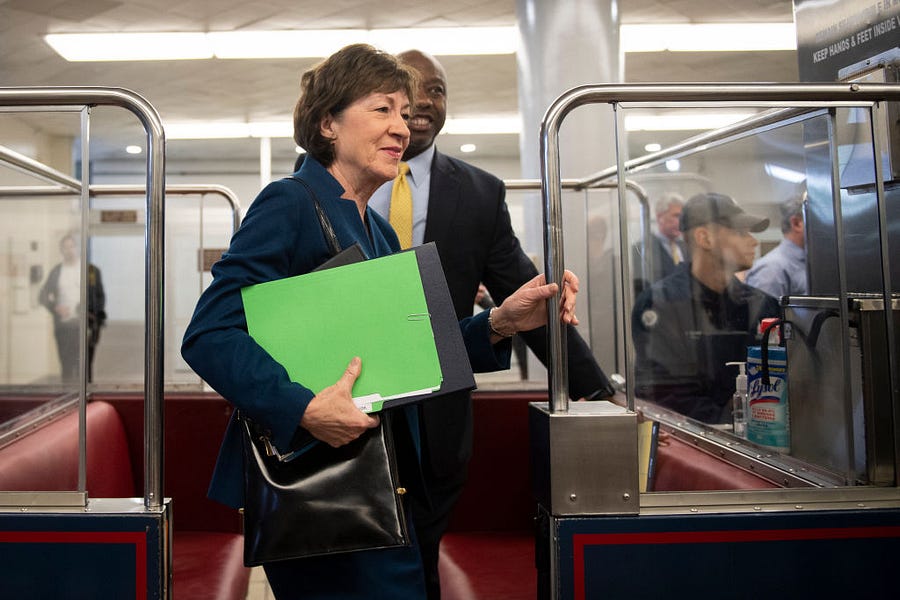Over the past few days whole sectors of the U.S. economy have come to a standstill. Closing our shopping centers, restaurants, and recreational facilities will end up leaving millions jobless. Various relief measures are being discussed or are working their way through Congress.
But this slowdown is nothing like an ordinary recession, where a slowdown in demand can simply be offset by putting cash into people’s pockets. Instead, much of the slowdown is the inevitable side effect of an intentional effort to slow the spread of the novel coronavirus. By slowing the spread of the virus, the logic goes, we buy ourselves time. This allows us to treat a greater share of those who fall ill, add much-needed health care resources, and develop treatment capability.
While we fight the contagion, many otherwise perfectly viable businesses and non-profits have no choice but to shut down. Social distancing requires that we consume less of the goods and services produced by a staggeringly wide array of industries, so even businesses that aren’t shuttered entirely are experiencing less demand. And this has knock-on effects on other businesses. Without an aggressive policy response, this will result in the permanent destruction of hundreds of thousands of firms and the loss of millions of jobs.
This is not the Schumpeterian process of creative destruction, where once-valuable firms go under, freeing up resources that can be better employed elsewhere. The workers whose jobs vanish will not be matched with new firms that allow them to add more value. Instead, firm-specific human capital disappears, debt starts building up, and the resources that are idle are idle only in order to slow the pandemic.
To halt this damaging process, dramatic government action is needed: first and foremost to end the public health crisis, but also the economic one by making sure workers have jobs to go back to once the virus has been brought under control. On the economic policy front we have finally seen some serious activity this past week. The House has passed relatively narrowly focused legislation that provides funding to the states and for testing, in case we ever manage to produce tests for those of us who are not currently active in the NBA.
The administration has backed away from its misguided focus on employee-side payroll tax cuts, and is now arguing for as much as $1 trillion in direct payments to households, loans for small businesses, and industry-specific bailout packages. A number of senators have also proposed large amounts of stimulus spending in the form of checks for households. Such stimulus is, unfortunately, not helpful in dealing with the intentional slowdown we are currently experiencing. After all, you can’t prop up demand for dining at a restaurant that has shut down.
For that reason, one proposal that deserves more attention is Maine Sen. Susan Collins’ the Collins Keeping Workers Paid and Employed Act, which contains valuable ideas that should form a core component of the economic policy response to the pandemic. In brief, Sen. Collins proposes federally guaranteed loans to small and medium-sized businesses and non-profits that do not lay off workers or cut payroll while the crisis rages. A company’s loans would be forgiven if it keeps its workforce employed and paid until the program comes to an end (tentatively at the end of June).
There is much to applaud in this proposal. The loans are generous: they would effectively make up for lost revenue, giving firm owners an incentive to stay open. They would also implicitly cover workers’ wages, reducing the need for large expansions to UI programs, which as it is are buckling under load. The proposal limits windfall gains: participants will see their profits capped at last year’s level, and the wages of high earners cannot be increased. Implementation would be swift: all qualified lenders who provide regular small-business loans could originate them, and fintech companies could be approved to help out as well.
One could of course think of tweaks and adjustments. We ourselves put a plan together, for example, that suggests treating firms in industries that have been forced to shut down or restrict their activities by state and local governments more generously than others. An advantage of doing so is that the usual competitive pressures continue to operate at least to some extent in industries that are less directly affected by the current cataclysm.
Finally, bear in mind that this response is only one plank in what should be an uncomfortably massive effort by all levels of government. In addition to combating the global public health crisis, the federal government needs to provide support to vulnerable households, offer funding to budget-constrained state and local governments, and ensure the stability of the financial system.
Steven Hamilton is assistant professor of economics at George Washington University and Stan Veuger is an economist at the American Enterprise Institute for Public Policy Research.
Photograph of Susan Collins by Caroline Brehman/CQ-Roll Call, Inc via Getty Images.






Please note that we at The Dispatch hold ourselves, our work, and our commenters to a higher standard than other places on the internet. We welcome comments that foster genuine debate or discussion—including comments critical of us or our work—but responses that include ad hominem attacks on fellow Dispatch members or are intended to stoke fear and anger may be moderated.
With your membership, you only have the ability to comment on The Morning Dispatch articles. Consider upgrading to join the conversation everywhere.